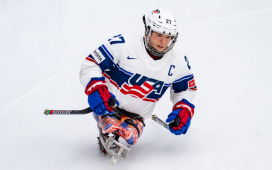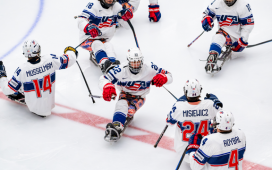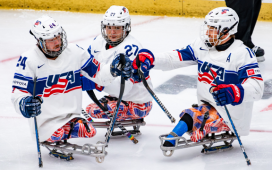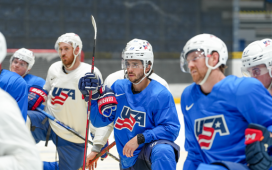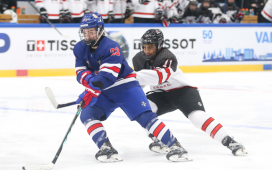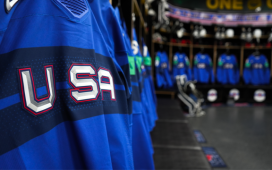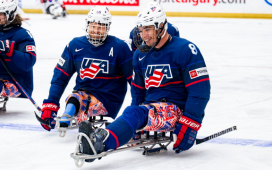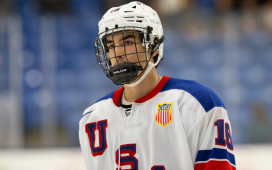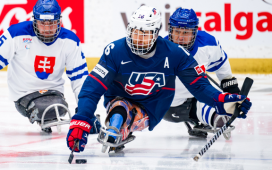This article is the fourth in a series examining the culture of hockey, how deep its problems may be and what some are proposing to change it. You can also read the first, senior writer Matt Larkin’s Progressive Minds Argue Need For Complete Overhaul, the second, senior writer Ken Campbell’s How One Victim of Racism Forgave His Coach, and the third, senior writer Ryan Kennedy’s How to be a Successful Coach in Today’s Game.
In 2016, former OHL and semi-pro goaltender Brock McGillis became the first professional hockey player to come out as gay. The Hockey News caught up with him to discuss the struggles he endured leading up to that moment, how his life has changed since, his new show and his ideas for how to clean up discrimination in the sport.
THE HOCKEY NEWS: How old were you when you first realized you were gay, and what was the hardest part about holding it back in a hockey environment?
BROCK MCGILLIS: I remember being six years old, and my parents were watching a movie, and there was a gay character, and I said, “What if I’m gay?” And they said, “If you’re gay, you’re gay. You’re Brock. We love you.” And I went to my room and cried.
And that conversation, I think, I suppressed for a long time. I think it was about when I started hitting puberty, so in my early teens, that I started to notice my attraction to men. More like…I knew something was different at a young age, but at that point it was like, “OK, there are urges and desires that are more along the lines of being physically attracted to men.”
And I hid it in hockey. There’s this idea that to be a hockey player, you have to be macho, hyper-masculine, a “bro,” tough guy – in men’s hockey, I should preface. And the language and attitudes and actions within the sport almost give the idea that if you’re gay, you’re less than those things. You’re weak, you’re soft, you’re effeminate, and thus you can’t be a hyper-masculine man, which is the perception of what it takes to be a hockey player. So I feared that people would see me in that light and I wouldn’t have opportunities in the game.
And that’s not even including the idea of people thinking you may be checking them out, or being uncomfortable with you in the locker room, and all those other things. I mean, you’re together quite a bit in hockey in the locker room. You spend a lot of time showering, changing, and even on buses, guys rip down to their underwear and hang out. So I worried that they would then feel as if I was looking at them sexually and that they wouldn’t want me there.
And on top of that, there’s this perception in sport, specifically for me in hockey, that a gay player would be deemed as a distraction because of the attention it would get. Personally, I don’t think that would be any more of a distraction. It would probably be a better distraction than players who are going through domestic assaults, players who are having substance abuse issues.
I see that it could be a rallying point. Similar to when you look at the Ottawa Senators with Craig Anderson and his wife, who was dealing with cancer. Nobody deemed that as a distraction, and rightfully so, because it’s a human condition – just like being gay. And it’s not something that is controllable or something that you do wrong. It just happens. And in that case, it seemed like a rallying point for the team and for the organization and the city.
THN: On top of being gay, you were a goalie, and goalies are already lone wolves on most teams. Did playing that position make things harder?
BM: Oh my God, definitely.. And on top of that, by the age of 15, I had a season-ending injury every year from then on. I think a lot of the injuries were psychosomatic, so not only was I a goaltender, who are already somewhat alienated, because they’re perceived to be different or weird, but they’re also not demonstrating that hyper-masculine physicality, rugged toughness that players have to exhibit. So when you combine that with, you know, I’m not fighting anyone, and I’m also gay, and I’m also a goalie who’s gay and always injured, I felt incredibly isolated. You don’t feel part of the team at all. Especially when I was traded or moved on to the professional ranks, you just don’t feel involved.
And at different points I was a backup, which also didn’t help, because if you’re the starter, you’re somewhat revered because wins and losses are essentially dictated by your play, so you’re at least given some respect. But if you’re a backup, nobody gives a s— to begin with.
THN: Did you have any allies during those dark times?
BM: Like, as a gay person?
THN: Yeah, like a confidant, whether that was outside the game or inside the game.
BM: Nobody knew I was gay. Nobody in my daily life, nobody in the sport until I was in my late 20s. I came out to family and friends in my late 20s. I started dating men at 23. But I was struggling far before that. And even when I was dating men at 23, I dated somebody for three years without a soul knowing. And even within that, we had an alias that he had for his friends, because I didn’t want them to see me on social media and figure out that I was playing professional hockey.
Prior to that, I was struggling — nobody knew why. One person I did tell and who was there for me quite a bit was (hockey reporter) Sunaya Sapurji. Sunaya talked me out of suicide one night. I probably felt safe with Sunaya because she was, in hockey at that time, the only one that I knew who was different. A person of color who’s female, covering the whitest male sport going. In my opinion she’s a trailblazer and probably the reason why so many doors have opened for women of color to start speaking and women doing journalism within the sport. She knew that I was struggling, but she didn’t know with what. She had to talk me down and was there for me quite a bit. My partner was there for me even though I kind of put him through hell. For three years, he never met a soul in my life. He couldn’t tell his friends my name… it breaks my heart today for him.
After we broke up, I moved to Montreal, and that’s when Brendan Burke (son of Brian Burke) came out. And Brendan and I became friends.
THN: How long before Brendan passed away did you meet him?
BM: We became friends that same year (2009-10). When he came out on TSN, I think it was that November, I reached out that night. And we talked almost every day.
Brendan and I became friends, and it was such a relief, because I could finally tell somebody I was gay. I could also talk to somebody about hockey. I finally had somebody I could talk to about my breakup, you know? It was the first time I’d been truly in love, and I’m heartbroken, and I have nobody to talk to. I’m also depressed and dealing with a lot of stuff on top of that, and from the age of 17 or 18 until I was 23, I had suicide attempts, suicidal thoughts. I was drinking heavily. And now my only friend who knows everything, I had this one friend, and it was Brendan.
And then one day, Brendan sent me a text message. And it said, “I can’t wait for the day that you’re out to your family like I am to mine.” And I didn’t answer him. It wasn’t because I was worried about telling my family. I knew they would be inclusive. They told me at six years old. But my fear was – they were so involved in hockey. My brother was a first-round pick in the OHL and played professionally. My dad scouted in the OHL and also coached minor hockey and junior hockey for 30-plus years. So I was afraid that, if they knew, they’d become more sensitive to the language used in locker rooms and around the game and stand up to it. And in the process, I would be outed, which would jeopardize any opportunity I had moving forward.
So when Brendan said that, I didn’t answer him. And two days later he passed away in a car accident. Those ended up being the last words he ever said to me. That’s why I speak. That’s why I share my story, because it humanizes it. So I ended up telling my brother right after. And I told my family and friends. But I stayed closeted in hockey at that point.
THN: When and how did you know it was time to come out publicly?
BM: I was working as a goalie coach, I was also assistant coaching in minor hockey helping out with a number of teams. I also did skill-development off-ice training, and I would train teams during the season. The summer before I came out, a hockey mom called me.
She said, “Brock, I want to set you up on a date.”
And I said, “Oh geeze. What am I going to tell her?”
I was panicked because I was like, “I don’t want to tell her. I don’t want to out myself.” Because I was living in Sudbury, and I was working in hockey, and I feared that if people found out, especially up there, I would lose any opportunity I had, and people would not want to work with me.
So when I got that call I panicked, but then I was kind of curious what she thought my type might be. So I decided to ask her.
I said “What’s her name?”
And her response was: “Steve.”
I said, “What?”
She said, “Brock, you’re gay.”
I said, “What? What are you talking about?”
She’s like, “Yeah. My son told me a couple years ago.”
And her son was 15 at the time. She goes, “All the boys know. They’ve known for years.”
I was working with approximately 100 players daily, 80 to 90 percent of which were male, and major junior players, some professional players, all the way down to minor hockey, and they all knew I was gay in northern Ontario and chose to work with me. I thought, “Wow, how cool is that? And I thought, “Maybe I should come out.”
And I thought “You know what? No, I’m not going to come out. I’m going to do a little sociology experiment.” Because I realized something: they know I’m gay, but they don’t know that I know that they know that I’m gay. So I started to observe them, almost like animals in the wild. And I always tried to curb racist, sexist and homophobic language with my athletes. But I started to notice that any time they’d say something homophobic, they would freeze up immediately and apologize.
I thought “Wow, isn’t this cool? Maybe I’m creating a shift.” Hockey culture is very insular from the age of six on, they’re segregated from their peers in arenas, and they conform to a culture that is constantly perpetuating itself. “Maybe I’m creating a shift within my little bubble within the bigger bubble that is the hockey world.” And I thought, “Or maybe they know I’m gay, so they apologize to me, but they go to school and call kids f— or they go on the ice and call kids f—.”
I really had no idea. ‘Til one day, I wasn’t there, and one of my colleagues who’d worked with players on speed training on the track had a bunch of players on the track. And then at the end of a two-hour workout he told them that they had 10 more 200-meter sprints. And one of my younger players who comes from a very progressive household – mom’s a dear friend of mine, dad gives me a hug every time he sees me and tells me he’s walking in this journey with me and he supports me – their child looked at the sprint coach and said, “This is so gay. I can’t believe you’re making us do this.”
And one of my older players, Bradley Chenier, looked at the younger player and said ,”We don’t say that here. Give me 50 pushups.” And the younger player said, “You’re right,” and did the pushups. And then, because these kids are social influencers, because they’re elite-level hockey players in Canada, they took that to their teammates and also their peers at school, and friends of theirs started adopting a pushup rule.
One night, the younger player, one of his teammates I’d never met, was on FaceTime with a young woman. She said “Let’s hang out.” And he said, “No, I can’t, I have practice.” And her response was “That’s so gay. I can’t believe you won’t hang out with me.” And he said, “Give me 50 pushups right now or I’m never talking to you again.” And that’s when I knew. Because these are two people that I’ll likely never meet.
THN: The ripple effect, eh?
BM: Yeah. These hockey kids created a shift in me through their actions without knowing it. And subsequently I was also creating a shift in them. But I still didn’t come out, I was afraid. I was afraid of how I’d be perceived in hockey culture; I was afraid that I wouldn’t be accepted, and at that point acceptance mattered to me. I was afraid I’d lose friends.
But then a couple of things happened as whispers started to get out about my sexuality. During that next hockey season, some of my competitors were outing me in Sudbury. And the association I grew up playing in – the association I coached in, my father coached in forever and my brother grew up playing in and then coached in – blackballed me. They would let me coach for free, but they wouldn’t allow my training off-ice stuff. I was the only one in the city not allowed to work with their players even though I worked with most players in the off-season.
So my father – and I knew this would happen – saw the president one day and said, “Is it because Brock’s gay?” And the president denied knowing that I was gay even though I knew he knew. After that conversation my dad had with him, more people found out about my sexuality. I showed up to the rink to help the team, and the head coach looked at me and said, “I don’t need your services any longer.” This is 2015, I was pushed out of hockey in northern Ontario, in Sudbury.
ML: Was that the last straw before coming out?
BM: A couple things happened right after that. (In June 2016) at Pulse nightclub in Orlando, it was a massacre, 49 people were murdered just for being queer, just for being LBGTQ+. And the reality is, for my community, those clubs, those bars are safe spaces. They’re places where you can go be yourself and not fear violence, not fear threats, not fear judgment, not fear verbal abuse, physical abuse, anything. You can go and love who you love, be yourself, and it’s supposed to be without any fear. Well that night, that was ripped away from us. Because this wasn’t somewhere across the world, this was in North America, we’re supposed to be the leaders in progress and inclusion and social issues. And that could have easily been me and my friends in Toronto. And the reality with all communities is, like, even in Toronto, I have friends that get called names walking down the street. I have friends in the past couple years who’ve been gay-bashed.
And then a couple days later, a friend of mine – we were supposed to go to a charity event together. He was fairly prominent in the gay world and had a ton of visibility at that point. He ended up on an ISIS hit list. Pulse happened on, I believe it was a Saturday, he contacted me the next Wednesday and said “Brock, I don’t think you should come to this event with me.” I said, “Well, that’s kind of rude,” I was all excited to go. He said, “Brock, I just got a call from the RCMP, and I’m on an ISIS hit list. They may target me at this event.”
And I said “Well, are you going?” He goes “Yeah, I have to. I organized it.” I said, “Well, if you’re going, I’m coming. I’m not getting scared out.”
So that Friday night, we got into an Uber. And I remember we were standing outside of his place, and we chugged a drink, and we just looked at each other like, “We’re going to die tonight.” And we went to this charity event, and I’ve never been to a charity event where they had one of those metal detector wands out and you’re being frisked and patted down to go in. We had undercover police around us.
Nothing ended up happening to him, thankfully, and he’s safe and fine and healthy today. But that was the moment. I reached out to Sunaya the next morning, and I said “I’m coming out.” And she said “Let’s do it.” So we got together, and I wrote an article for Yahoo! Sports and came out publicly.
THN: How has your life changed since that moment? What’s your typical day like?
BM: My life has flipped upside-down. It’s crazy, because I’ve never felt better. I’m happier than I’ve ever been. I’m more stressed than I’ve ever been. I’m very fortunate that I was able to work with psychologists and get the help I needed to get myself to a good place to be able to take on everything I’ve taken on since. I diligently still work on myself. I’m still in therapy. I meditate twice a day, I do a lot of work on my emotional well-being, a lot of self-care. I’m a healthy eater, physically active. Because of the toll that this life takes.
It was quite overwhelming, initially. The first day alone, I received over 10,000 messages when I came out. And, you know, all of a sudden I’ve become the poster boy for gay hockey or being a gay man in the sport. And since then, to start off, one school called me and asked me to speak. I never thought about any of this. I just did it as a way to use my platform as a hockey player to start creating shifts because of what I went through and what I saw my friends go through and what happened at Pulse.
And now it’s crazy. In the past two weeks, I went to Vancouver for a day, and then I flew to California to speak at a school. And the night I came home, I got in at about 3:00 in the morning. And then the next morning everything dropped with Akim Aliu. So then when I woke up, I was inundated with requests, and from that Tuesday until Friday, I did about 30 or 40 media hits. On top of trying to organize my schedule, I’ve put together a team in the U.S., a team in Canada, I have a management team now that books out bigger things for speaking and whatnot. Then that Friday I drove to Windsor to speak at a suicide-prevention mental health event that evening. Found out during the week that I’d be going to Montreal on Saturday for a film festival. I was in a documentary on LGBT athletes that was headed to Montreal, premiered there at this festival.
THN: And on top of that you have a new TV show, This is S—. What’s it about?
BM: This is S— is a show I created with World of Wonder, who does Million Dollar Listing and RuPaul’s Drag Race and creates a ton of digital content. With Mrs. Kasha Davis, who’s a Drag Race alumni and star. Kasha and I have a passion for empowering and working with youth. I want to help eradicate teen suicide and drop those rates because they’re staggeringly high, especially among the LGBTQ+ population.
So essentially the premise is we all have s—. Gay, straight, hockey, non-hockey, jock, non-jock, we’re all dealing with stuff. As human beings we’re a little self-absorbed. When we’re struggling, we tend to think our struggle is the only struggle, we tend to think we’re the only ones dealing with this, and it’s the worst thing in the world, and nobody could be dealing with something as bad as we are. I’m an ex-professional hockey player who was suicidal, depressed and drank heavily to numb it and dated women and denied my truth, and Mrs. Kasha Davis was married to a woman and is a gay man and a drag queen and also a recovering alcoholic and has gone through a lot of stuff. And when we recognize that we’re not special in that sense, that we all have s—, it gives it a little less power. When we recognize that and start talking about the different things we struggle with instead of internalizing it, it’s very similar to coming out as LGBTQ+.
When you come out with that, it takes some of the weight off, and by sharing things we’ve gone through and sharing struggles that are traditional struggles, maybe, within the community or generalized society, we’re hoping it’ll empower people to recognize that you can’t avoid it. You need to deal with it, deal with your s—, and you’ll be a better person.
What I’ve come to realize is: it’s great that I go speaking everywhere, and I love it, but I can’t be everywhere. In the past two years I’ve done over 100 schools, maybe 150. I’ve spoken at corporates all over North America and universities, but I’m not going to reach everyone by going there because I can’t be everywhere. But by creating content that they can find online and being a resource to them via…I mean, people reach out to me daily through social media and different things, so I can then be of even more support. I can give them the message and also be a resource for those struggling who can’t meet me in person and engage with me.
THN: What do you think it will take for an active NHL-level, NFL-level, superstar athlete to come out? And are you tired of that question?
BM: I get it asked all the time. I don’t mind being asked it. The first question’s usually, “When do you think somebody will come out?” And I say “I don’t know, 50 years?” And they’re shocked. But I don’t think we’ve done anything to create a culture where they can come out. We seem to put the onus on the player and say, “Why hasn’t somebody come out?”
The onus when I came out: all mics, all cameras and everything, have been on me. And I don’t mind, I’ve chosen this life, but it’s not necessarily fair to that person. Do you know what I mean? We’re trying to put the pressure on one individual to come out – when we haven’t created a culture that’s inclusive and supportive and would enable them to come out. Reports are now that Marc Crawford was using homophobic language in the NHL. If your NHL coaches are physically and verbally abusing players and using racist, sexist and homophobic language, what do you think is happening at minor hockey levels? These are supposed to be educated, well-versed people who’ve gone through the system. If they’re doing this, and they’re the role models for coaches, what do you think is happening elsewhere? It’s even worse.
So the culture has to change, and I think we’re at the dawn of the awakening. We need people to get on board and become allies to the shift – even people who’ve screwed up, because I don’t blame anyone for this, because they’re products of…I don’t condone violence or racist comments or homophobia or sexism, but they’re all products of their environment, of a culture that’s been perpetuated for generation after generation that’s been exactly like this. So what are we going to get? We’re going to get more of this. That player’s not going to come out, come on!
Even Bill Peters’ comments to Akim Aliu were racist and homophobic all in one. It was overt and directed at a player of color, and it was also homophobic, so (if there was a) gay guy in the room….guess what he’s not doing? And then a week later, he sees Akim Aliu get sent down to the East Coast. Think (the gay player) is coming out?
We haven’t created an environment that would enable minority people feeling comfortable being part of it. It has to shift at the NHL level all the way down to minor hockey and it has to do a lot with the insularity of the sport. They have been segregated from such a young age and not exposed to anything but hockey culture, and then their role models are ex-hockey players who are now coaching and have been in that environment for a long time, so it’s just, it’s a vicious cycle.
So, am I tired of that question? No. Has my answer shifted? Yeah. I used to just say “We won’t see anyone for 50 years.” Now I’m saying, “Well, if you don’t shift your culture and you put the onus on the player, it’s going to be longer.”
